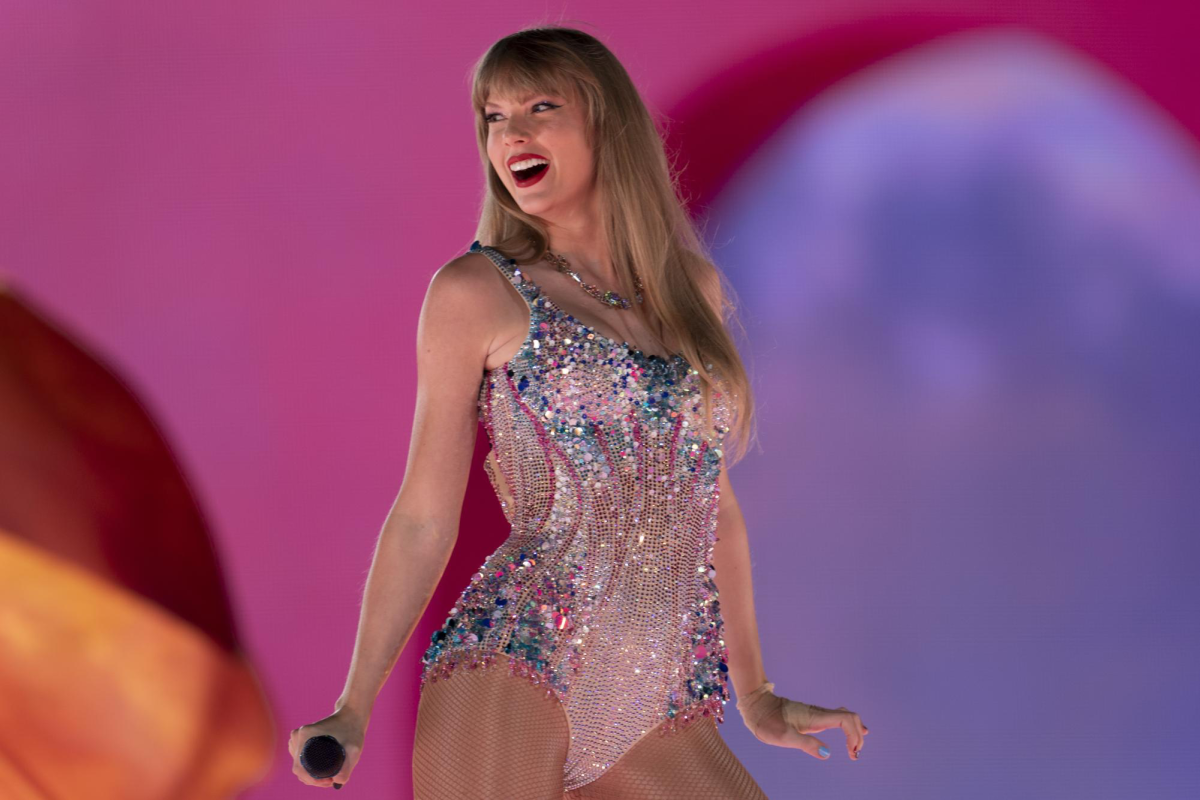Taylor Swift’s “The Eras Tour” gets its name from the many “eras” of her music career. All of her 11 albums and four re-recordings boast different themes, vibes, sounds and visuals. For example, while her 2006 self-titled debut album espouses bright teal and green colors with remnants of early-2000s cowgirl culture, both her original “1989” album and its re-recording scream city life with hues of blue and tan. Her original “reputation” era was the epitome of edge with black, angsty makeup and lots of snake imagery. Her album after that, “Lover,” is full of bright pastels and dreamy, cloud-like visuals.
With each new release, Swift — who is arguably the biggest pop star of the last two decades — is expected to reinvent herself and the wheel. With each new album, she must rise to the challenge of turning out pop radio hits along with new sounds and new aesthetics to please the masses. While we can all reminisce and beg for another “Reputation”-like sound or more “Folklore” and “Evermore” albums, ultimately, the masses outside the Swiftie fan base will likely not be as receptive to a repetition of her old sound and imagery. Female artists must continuously meet the demands of a constantly changing music scene in which they must shelve out a new, unique identity with each new drop. Queen of pop Taylor Swift is no exception.
While Swift is a notorious example of the constant evolution female pop stars must endure, there are very few modern female pop stars who escape the same fate as Ms. Taylor Swift. Ariana Grande, Dua Lipa, Olivia Rodrigo, Sabrina Carpenter and more are all expected to evolve every few years and with each new album. They dye their hair, change their street style along with their touring looks and sometimes even speak or sing completely differently. Up-and-coming pop star Chappell Roan’s first songs are sung in an incredibly different way than her newest hits, with the first few having a stereotypical cursive twang and her newer hits featuring powerful belts and vocal flips. Sabrina Carpenter calls upon country techniques reminiscent of Kacey Musgraves in her hit single “Please Please Please,” which is a drastic switch from her original pure-pop sound she’s been boasting for years.
This article by Newsweek comments on Ariana Grande’s change in accent and notes the years in terms of her album drops. Originally critiqued by a TikToker, fans have been quick to notice Grande’s change in appearance and sound ever since she was cast as Glinda in the upcoming “Wicked Part I” movie and the drop of “Eternal Sunshine.” Back around her “Yours Truly” and “Dangerous Woman” albums, Ariana Grande can be seen in the video speaking in what is commonly referred to as a “Blaccent.” However, in more recent clips, her accent ceases to exist.
The time between “Yours Truly” and “Eternal Sunshine” is 11 years, and no person is bound to stay the same during that time. Growing and evolving not only as an artist but also as a person is completely normal, but the constant identity shifts during new releases are breaching absurdity. The change is drastic and noticeable. Ariana Grande has left the circle skirts behind in “Yours Truly,” the latex in “Dangerous Woman” and the decadent pinks and bling in “7 Rings” to be where she is today. Her identity, what she looked like and how she acted are evident in each song and album she released. And a mega-fan could look at an older picture of her and immediately know what era of music she was in and what album she had just released.
Nothing speaks more highly to the demand that female pop stars face than criticism for Olivia Rodrigo’s sophomore album. Rodrigo, one of the fastest-growing pop sensations of the last few years, released her second album in 2023. While many of the songs were well received by fans, with smash hits like “Vampire” and “All-American Bitch,” many criticized her for “Guts” sounding far too much like her first release, “Sour.” Between the purple hues and American high school imagery of plaid skirts, cheerleader looks and use of megaphones, the two could be sister albums.
While I do not listen to Rodrigo’s music personally, when I sat down to listen to “Guts,” my own critique was that it sounded too much like “Sour.” But why does that necessarily have to be a bad thing? I had succumbed internally to the pressure these musicians face to change their sound and image myself by critiquing Rodrigo’s album in such a way. While perhaps calling it unoriginal is a valid critique, if it’s good music, it’s good music. Who cares if it sounded like her new songs were off “Sour” or not if the song is catchy and people enjoy listening to it?
The forcible evolution of female musicians is most noticeable when compared to their male counterparts. While Taylor Swift has a whole three-hour set dedicated to uplifting each of her albums, complete with outfit changes, new styles of dances and set features, many male artists are not held to the same standards as many of their female counterparts.
While many have evolved over time simply due to getting older, there is very little pressure for men to evolve in the same way as women. Ed Sheeran, one of the biggest male pop music singers and writers, has sounded virtually the same since he hit the music scene with “+” in 2011. And while his voice has aged and his sound has gotten a little stronger and more confident, nobody expects him to put on a three-hour performance complete with dancers, backgrounds and outfit changes to celebrate each era of music he was in.
And while Rodrigo was criticized for sticking with the genre and imagery she had used in her prior release, Sheeran has not one time been knocked for it. If Harry Styles continues forth with the frills and colors of his usual fits and soft rock vibes, no one will criticize him for it. Charlie Puth continues to put out the same, generic pop music over and over and nobody criticizes him for it. If there is critique, it rarely points to their lack of originality or endless reuse of old sounds.
Women are being forced to continuously change themselves and evolve in the music scene, constantly going one step further and fitting themselves into a new niche with each new release, while men are allowed to get comfortable in their positions. Artists should be continuously pushing themselves to drop new, interesting music and pushing their sound, but the double standard in pressure men and women in the pop sector face is alarming and going on right under our noses.
Livia LaMarca is the assistant editor of the opinions desk who misses using the Oxford comma. She mostly writes about American political discourse, US pop culture and social movements. Write to her at lll60@pitt.edu to share your own opinions!



